
Annual Review of Chemical and Biomolecular Engineering
Scope & Guideline
Elevating Standards in Chemical and Biomolecular Research
Introduction
Aims and Scopes
- Chemical Process Engineering:
Focus on the design, optimization, and scale-up of chemical processes, including the application of advanced modeling and simulation techniques. - Biomolecular Engineering:
Exploration of engineering principles applied to biological systems, including the design of therapeutics, biomaterials, and bioprocessing techniques. - Sustainable Chemical Technologies:
Emphasis on sustainable practices, such as carbon capture, recycling, and the use of renewable resources to reduce the environmental impact of chemical production. - Advanced Materials Science:
Investigation into the development and application of novel materials, including nanomaterials and polymers, for various engineering applications. - Emerging Technologies and Innovations:
Incorporation of cutting-edge technologies such as machine learning, CRISPR, and bioinformatics in chemical and biomolecular engineering.
Trending and Emerging
- Biological Upcycling and Waste Valorization:
The increasing focus on converting waste materials into valuable products showcases a trend towards sustainability and resource efficiency in chemical engineering. - Integration of Machine Learning in Chemical Engineering:
The application of machine learning techniques for process optimization, material design, and predictive modeling is rapidly gaining momentum, reflecting the digital transformation of the field. - Hydrogen Economy and Renewable Energy Sources:
Research into hydrogen production and its integration into existing energy systems is on the rise, driven by the global push for cleaner energy solutions. - Advanced Drug Delivery Systems:
There is a notable increase in studies focused on engineering biologics and nanotherapeutics, emphasizing personalized medicine and targeted therapies. - Characterization and Application of Nanomaterials:
The exploration of nanomaterials for various applications, including catalysis, drug delivery, and energy storage, is a significant emerging theme in recent publications.
Declining or Waning
- Traditional Chemical Manufacturing Processes:
Research centered on conventional chemical manufacturing methods appears to be decreasing as newer, more sustainable processes gain traction. - Basic Thermodynamics and Fluid Mechanics:
While foundational topics remain important, there has been a noticeable shift towards more application-driven research, leading to less emphasis on basic theoretical studies. - Classical Catalysis Studies:
With the rise of advanced materials and novel catalytic systems, traditional studies of catalysis using well-established methods are becoming less frequent. - General Polymer Science:
Research focusing solely on traditional polymer science without integration into biomaterials or applications in sustainability is seeing a decline. - Conventional Waste Treatment Methods:
As innovative recycling and upcycling technologies emerge, research on traditional waste treatment methods is becoming less prevalent.
Similar Journals

CHEMIE INGENIEUR TECHNIK
Advancing the Frontiers of Chemical Engineering and Technology.CHEMIE INGENIEUR TECHNIK, published by WILEY-V C H VERLAG GMBH, stands as a significant academic journal in the fields of Chemical Engineering, Chemistry, and Industrial and Manufacturing Engineering. With an ISSN of 0009-286X and an E-ISSN of 1522-2640, this esteemed journal has been contributing to the body of knowledge since 1949 and plans to continue its legacy until 2024. Notably, the journal holds a Q2 quartile ranking in 2023 across various categories, illustrating its recognized impact and relevance within the scientific community, with Scopus ranks indicating it falls within the top 60th to 51st percentiles of its respective fields. Although currently not open access, CHEMIE INGENIEUR TECHNIK provides readers with comprehensive insights into contemporary research, technological advancements, and practical applications, making it an essential resource for researchers, professionals, and students who are keen to stay abreast of developments in chemical processes and engineering advancements.
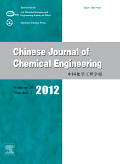
Chinese Journal of Chemical Engineering
Connecting Theory and Practice in Chemical Engineering ExcellenceChinese Journal of Chemical Engineering, published by CHEMICAL INDUSTRY PRESS CO LTD, is a premier academic journal dedicated to advancing the field of chemical engineering and related disciplines. With a strong emphasis on innovative research and practical applications, the journal spans a wide range of topics including biochemistry, environmental engineering, and general chemistry. Boasting a commendable impact factor and a consistent presence in Q2 quartiles across multiple categories, it ranks impressively in Scopus, notably positioned in the top percentile of its fields, enhancing its credibility and reach among the scientific community. Published continuously since 1993 and converging towards its 2024 goals, the journal remains committed to fostering sustainable and impactful research. Researchers, professionals, and students alike will find invaluable resources and cutting-edge insights, making the Chinese Journal of Chemical Engineering an essential platform for disseminating pivotal work in the realms of chemical and environmental sciences.
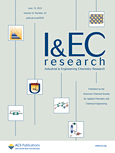
INDUSTRIAL & ENGINEERING CHEMISTRY RESEARCH
Fostering Collaboration in Chemical Engineering DiscoveriesINDUSTRIAL & ENGINEERING CHEMISTRY RESEARCH, published by the American Chemical Society, is a pivotal journal that disseminates high-quality research in the fields of Chemical Engineering, Chemistry, and Industrial and Manufacturing Engineering. With an impressive impact factor, this journal ranks in the top quartile (Q1) across multiple categories, reflecting its significance and influence within the scientific community. Since its inception in 1987, IECR has provided a platform for researchers, professionals, and students to publish innovative findings that advance the understanding and application of engineering chemistry. Though it operates under a subscription model, the journal continues to foster collaboration within the field, inviting contributions that span theoretical advancements, experimental studies, and practical applications. Whether you are engaged in academia or industry, IECR serves as a vital resource for staying abreast of the latest developments in chemical and engineering research.
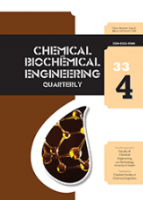
CHEMICAL AND BIOCHEMICAL ENGINEERING QUARTERLY
Bridging Academia and Industry in Chemical InnovationsCHEMICAL AND BIOCHEMICAL ENGINEERING QUARTERLY, published by the Croatian Society of Chemical Engineering Technology, is a distinguished open-access journal that has been providing a platform for the dissemination of innovative research since its inception in 1987. With a focus on the fields of biochemistry and chemical engineering, this quarterly journal addresses a wide array of topics, including process chemistry and technology, making significant contributions to both academia and industry. Despite its current positioning in the Q4 category for biochemistry and Q3 for miscellaneous chemistry and process chemistry in 2023, the journal continues to strive for greater impact, catering to researchers, professionals, and students alike. Its open-access model, in place since 2001, ensures that cutting-edge research is accessible to a broad audience, fostering collaboration and knowledge sharing within the scientific community. By promoting high-quality research and providing insights into the latest advancements, Chemical and Biochemical Engineering Quarterly remains an essential resource for those involved in the chemical and biochemical engineering disciplines.

Frontiers in Chemical Engineering
Unlocking New Horizons in Chemical EngineeringFrontiers in Chemical Engineering is an esteemed open-access journal published by Frontiers Media SA, dedicated to advancing knowledge in the dynamic field of chemical engineering. Since its inception in 2019, this journal has rapidly gained recognition for its rigorous peer-reviewed articles and innovative research contributions, achieving notable quartile rankings such as Q2 in Chemical Engineering and Q3 in both Bioengineering and Catalysis by 2023. With an emphasis on providing accessible and cutting-edge research, the journal caters to a diverse audience of researchers, professionals, and students interested in the latest developments and methodologies within the chemical engineering discipline. Hailing from Lausanne, Switzerland, Frontiers in Chemical Engineering embodies a commitment to enhancing collaborative scientific communication, making crucial research findings available without barrier. By publishing high-quality articles that address both theoretical advancements and practical applications in chemical engineering, this journal serves as a pivotal resource for fostering innovation and collaboration across the global research community.

Carbon Capture Science & Technology
Transforming Tomorrow: Pioneering Carbon Capture SolutionsCarbon Capture Science & Technology, published by Elsevier, is an esteemed, peer-reviewed, open access journal dedicated to advancing research in the growing fields of chemical engineering, energy, and environmental science. With an ISSN of 2772-6568, this influential journal has established itself since its inception in 2021 and continues to make notable contributions, reflected in its impressive Q1 rankings across multiple categories, including a #14 rank in Environmental Science and a #13 rank in Chemical Engineering as of 2023. The journal aims to provide a platform for the dissemination of innovative carbon capture technologies and methodologies that address vital climate challenges, ensuring broad accessibility for researchers, professionals, and students alike. By embracing open access, Carbon Capture Science & Technology fosters a collaborative approach to knowledge sharing, making it an indispensable resource for those committed to sustainability and environmental preservation.
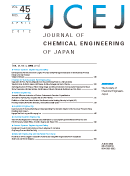
JOURNAL OF CHEMICAL ENGINEERING OF JAPAN
Connecting Researchers to Transform Chemical EngineeringJOURNAL OF CHEMICAL ENGINEERING OF JAPAN is a distinguished academic publication in the field of chemical engineering and chemistry, published by Taylor & Francis Ltd. With its ISSN 0021-9592 and E-ISSN 1881-1299, this journal has been a vital resource for researchers and practitioners since its inception in 1968 and continues to provide essential insights and advancements through 2024. The journal operates under an Open Access model as of 2023, promoting wider dissemination of research findings and encouraging collaboration within the global scientific community. Currently categorized in the Q4 quartile for both Chemical Engineering and Chemistry (miscellaneous) in 2023, it ranks within the lower percentiles of its respective fields, offering a platform for emerging scholars to publish their work and gain visibility. As part of Japan's academic landscape, it addresses numerous aspects of chemical engineering, fostering innovation and technical development that contribute to the industry's growth. Engaging with this journal is paramount for those looking to stay informed on the latest research trends and applications in chemical processes.
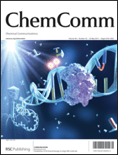
CHEMICAL COMMUNICATIONS
Fostering collaboration in the world of materials science.Chemical Communications, published by the esteemed Royal Society of Chemistry, is a prominent journal within the field of chemical science, focusing on the dissemination of cutting-edge research in a variety of sub-disciplines including catalysis, materials chemistry, and electronic materials. Operating without an open access model, this journal provides critical insights from contributors around the globe, enhancing our understanding of complex chemical interactions and innovative applications. Ranked in the top quartile for several categories such as Ceramics and Composites, and Metals and Alloys, Chemical Communications boasts impressive Scopus rankings, securing strong positions across multiple fields and showcasing its influence within the scientific community. The journal is committed to advancing knowledge and fostering collaboration among researchers, professionals, and students, making it an invaluable resource for those looking to stay abreast of the latest advancements in chemistry and materials science. With a publication history dating back to 1965 and continuing into 2024, its rich archive serves as a vital repository of chemical research and development.

Green Chemical Engineering
Innovating chemical engineering for a sustainable future.Green Chemical Engineering, an esteemed journal published by KEAI PUBLISHING LTD, plays a pivotal role in advancing the field of sustainable chemical engineering. With an Open Access policy since 2020, this journal facilitates the free exchange of cutting-edge research and innovations that address critical environmental challenges. Based in China, it has rapidly gained recognition with impressive category quartiles, ranking Q1 in numerous relevant fields including Catalysis, Chemical Engineering (miscellaneous), Filtration and Separation, and Process Chemistry and Technology. Its presence in Scopus highlights its significance, with top rankings (e.g., Rank #4/19 in Filtration and Separation) placing it in the upper echelons of chemical engineering literature. Designed for researchers, professionals, and students alike, Green Chemical Engineering aims to foster a collaborative platform for the dissemination of pioneering work that contributes to a greener and more sustainable future.

THEORETICAL FOUNDATIONS OF CHEMICAL ENGINEERING
Unveiling the Foundations of Chemical EngineeringTHEORETICAL FOUNDATIONS OF CHEMICAL ENGINEERING is an esteemed academic journal published by PLEIADES PUBLISHING INC, dedicated to advancing the field of chemical engineering and chemistry through rigorous theoretical discourse and scholarly communication. With a history of publication dating back to 1974, the journal has been a vital resource for researchers and professionals, contributing to the foundation of knowledge in this multidisciplinary domain. Although it does not offer open-access options, it remains an essential platform for innovative research, boasting a 2023 ranking in the Q3 quartile for both Chemical Engineering and General Chemistry categories. The journal is indexed in Scopus, where it ranks #210 out of 273 in Chemical Engineering and #317 out of 408 in Chemistry, emphasizing its growing relevance within the scholarly community. Researchers, educators, and students alike can benefit from the insights and findings shared within its pages, making it a critical venue for those seeking to enhance their expertise in theoretical chemical engineering.